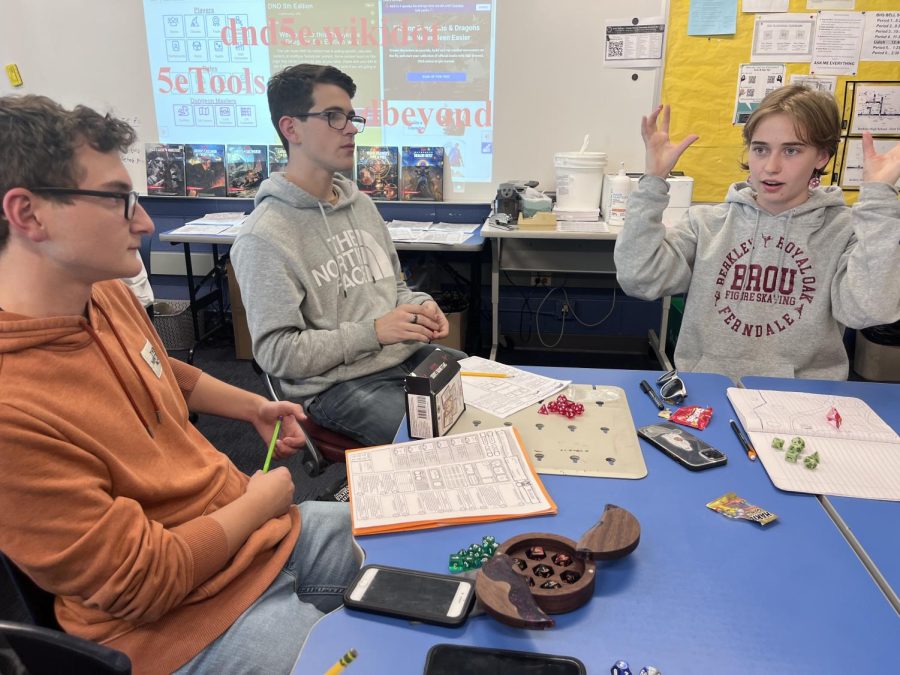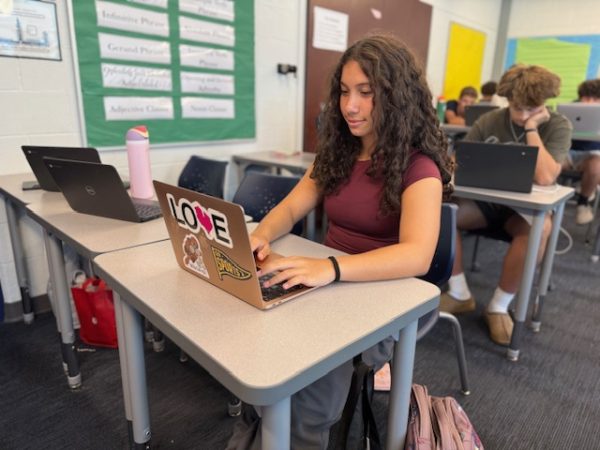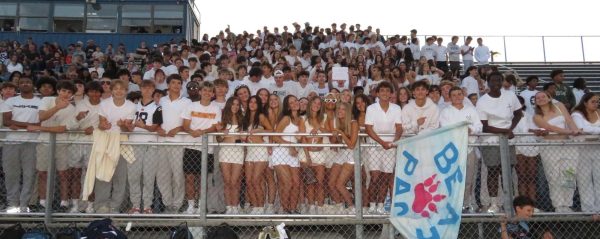Clubs of the Month: Dungeons and Dragons and Robotics
Dungeon Master Gray Garska (right) gives a vivid character description. Joe Ozanich (far left) and Evan Lupher (mid-left) listen intently.
With so many clubs to choose from at BHS, students may find it daunting to find the one that is right for them. To offer a little help, here’s a spotlight on two clubs, one old and one new, that may be the perfect fit for you.
The first club, Dungeons & Dragons, is new to Berkley this year. Created by seniors Gray Garska, Harriet Parrish, and Jillian Dionne, this club’s purpose is all in the name. It’s a place to gather with like-minded students and play Dungeons and Dragons (D&D). For those unfamiliar with the game, D&D is a tabletop roleplaying game based on random dice rolls. You create a character and play as them, facing journeys that your Dungeon Master, or DM, writes for the campaign. You play with a group of others portraying their own characters and navigate the story together. Club founder and DM Garska describes it as “a more in-depth way of storytelling.”
The trio started the club for a few reasons. For one, they wanted to spread their passion for the game, but they also wanted to make D&D more accessible to students. “We wanted to get a bigger outreach and to introduce more students to it to get a wider range of people into tabletop roleplaying games,” said Garska, “We can start with this and introduce so many people into these games.” Because D&D can be so complicated, it can sometimes be intimidating to start. Garska also made an important point about the traditional target audience of the game. “Stereotypically, D&D has been for white cis males, so having a lot more female, people of color, and queer people come into these spaces introduces them to a game that they might not have considered before”.
D&D is a very open experience that can go in many directions. While fighting monsters is a significant aspect of the game, improv and storytelling were concepts that Garska mentioned often. Each character’s story is often just as large of an aspect as the fighting. Garska’s favorite part about D&D as a storytelling medium is how involved it can be. “You can read a book, you can watch a movie, but there’s only a certain amount of immersion that you get from those. With D&D, you can actually be in that world,” they said.
Because of its open-ended nature, D&D has something for pretty much everyone. But Garska did note that there are a few specific interests that may lead to someone enjoying the game. They specifically mentioned that people who play video games, read manga or watch anime, along with people that enjoy other fantasy stories, like The Lord of the Rings, may enjoy this club. “It’s a good time! You kind of just have fun, fight monsters, and pretend to be elves!”
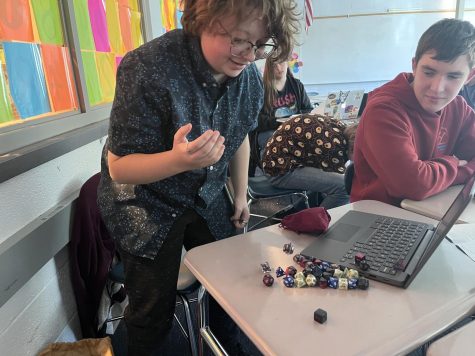
All someone really needs to play D&D are some dice and a character idea. A website like D&D Beyond can help to make the experience easier for new players. There, you can make characters and roll virtual dice when needed.
Garska mentions that even if you come in with no experience, the club will teach you how to play. “People who’ve never even thought of joining or aren’t typically interested in ‘nerdy’ interests should still try it out, as it’s a great way to make new friends and have a good time.”
D&D Club meets every other Tuesday after school in room 255, and has more casual lunch meetings every Wednesday in the same room. They hope to see you there!
Moving on to a club that’s been present at BHS for a while, FIRST (For Inspiration and Recognition of Science and Technology) Robotics, may be perfect for you. This club uses engineering skills to build robots that can perform certain tasks. As I walked into their build room near the practice field across from BHS, I could sense that everyone was busy with something to do. Some kids were deconstructing an old robot, others were trying to fix some hardware, and another group was adjusting wires and coding a bot. Additionally, they had old robots on display throughout the build room; some were used in past competitions. One, named Monstrosity, is the t-shirt cannon seen at pep assemblies.
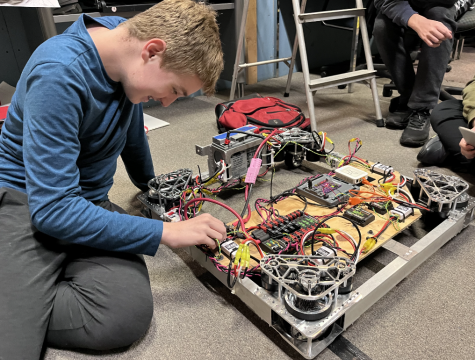
Robotics is not student-led like D&D club. Instead, there are adult mentors that help to lead and organize certain aspects of the team. The club could be compared to a sport, as the group meets multiple times a week and programs robots to utilize in competitions. They code and use a computer-aided design, or CAD, software to manufacture and 3-D print parts for the bots.
Club business manager, junior Ciaran Mears, describes the differing knowledge involved in Robotics. “It’s not all straight engineering. If you wanna help out on business stuff and you’re not doing anything, you can. If you wanna learn how to use CAD, you can. If you’re doing something, just do it,” he says. So it’s not all math and coding. The main two categories of the team are business and build. In business, you can manage finances, work on advertising, or take photos and videos for the team. The build category is split into framing, training, electrical work, and driving (operating the robot).
Competitions are a large part of Robotics, and every club member contests how fun they are. Junior Reagan Berryman, a team leader who specializes in driving, describes the competitions very excitedly. “The community at competitions is pretty cool”, she noted. The competitions are based on the concept of “gracious professionalism”, where teams will help each other if needed while remaining competitive. The group builds a robot to compete in a chosen game that changes every year, which every FIRST team in the world plays. The objective is to beat every other school. The rounds last two minutes and forty-five seconds, and the first fifteen seconds are autonomous, meaning that no one can touch the robot or controls. Competitions take place in high schools and colleges. This year, the world competition takes place in Houston, TX. “We compete from the beginning of January to April (when states and worlds happen)” Mears explains.
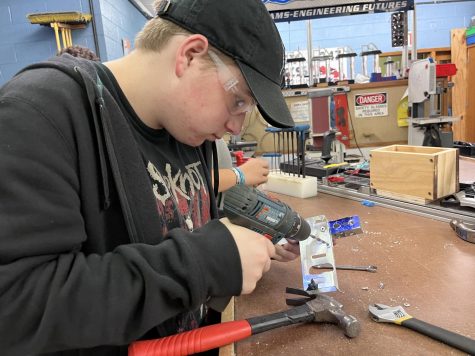
In Robotics, problem solving is important, notes freshman Zach Bernzweig. “If anything is wrong it can basically take down the entire robot,” he noted. Looking at the fine details and analyzing them is essential, so Robotics may be perfect for someone like that. Because of its open-ended nature, it likely won’t be difficult to find something for you. “Right now, we target a lot of STEM (Science, Technology, Engineering, Math) classes, like computer science, physics, and even digital art,” Mears notes. There is no engineering experience required to join, and there is something unique for everyone to set their mind to completing.
If this sounds at all interesting to you, Robotics meets Tuesdays and Thursdays from 6-9 p.m. during their off-season, with the season lasting from early January to April. They meet in the build room across Catalpa near the trash lot and are always looking for new enthusiastic members!


